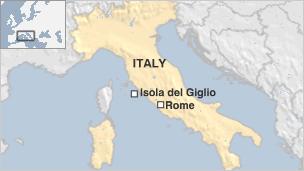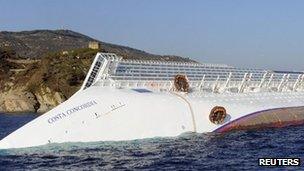Britons on board stricken Costa Concordia ship off Italy
- Published
Cruise ship shop worker Fabio Costa: ''People started to panic''
Several Britons were on board a cruise ship which ran aground off the Italian coast, leaving at least three people dead.
The Costa Concordia hit a rock on Friday evening near the island of Giglio and listed about 20 degrees.
The Foreign Office said it believed that at least 30 UK nationals were among the 4,000 passengers and crew.
It has set up a phone line for people who are concerned about their relatives and is offering advice on its website., external
Divers have searched rooms in the cruise ship, which is lying on its side 200m (650ft) off Giglio.
About 40 people are still believed to be missing.
Two French passengers and a Peruvian crewman are known to have died.

A Foreign Office spokesman said he had no details of any British casualties.
Staff from the embassy in Rome has arrived in the area and are providing consular assistance.
Christopher Prentice, the British ambassador to Italy, told BBC News he had spoken to some British survivors who he described as being "relieved but worried about others".
Anyone concerned about British passengers should contact either the British Embassy in Rome on +39 06 4220 0001 or the Foreign Office in London on 0207 008 1500.
'Lucky to be alive'
Many people swam ashore or boarded lifeboats.
Coast guard captain Cosimo Nicastro told Italian TV that divers had carried out an extensive search of the waters near the vessel and found no bodies.
But he added that there still might be some "in the belly of the ship".
The precise number of those who remain unaccounted for is unclear. Late on Saturday local official Giuseppe Linardi said up to 41 people were missing.
Earlier he had put the figure at 70, adding that some might still be housed in private homes on Giglio - where the survivors first reached land.
A number of British entertainers and dancers are thought to be among the 1,000-strong crew.
Sandra Cook told BBC News that her daughter Kirsty, who was one of eight British dancers working on the ship, escaped by climbing down a rope ladder into another boat.
"I asked whether she had anything. She'd lost everything and she said that she was lucky to be alive and very thankful," said Mrs Cook, who spoke to her daughter earlier.
Fabio Costa, who worked in a shop on the ship, told the BBC those on board felt the boat hitting something, then "everything just started to fall" and "all the glasses broke".
"Everybody started to panic and run," he said.
Travel journalist Simon Calder said the accident echoed the sinking of the Titanic 100 years ago.
He told the BBC: "We've had stories of people jumping into the water and I dare say the behaviour of some people would have been informed by their visions of that awful night in the Atlantic.
"What is going to trouble the entire cruise community is how you get any fatalities at all given this was an absolutely routine cruise through relatively calm waters and something has clearly gone horribly wrong with the evacuation."
Costa Cruises, the company which owns the ship, said it could not yet say what had caused the accident.
"The gradual listing of the ship made the evacuation extremely difficult," a statement said.

The ship is now resting on its side just off the island of Giglio
"The position of the ship, which is worsening, is making more difficult the last part of the evacuation."
One of those on board was Rose Metcalf, a 22-year-old cabaret dancer from Witchampton, Dorset.
Her father Philip Metcalf said his daughter, who was not hurt, had been airlifted to an air base in the Tuscany region of Italy.
"The ship had rolled on its side so she was ready to jump in the water," he said, adding that his daughter told him conditions had been "cold and dark".
The Passenger Shipping Association said its thoughts were with those passengers and crew involved with Costa Concordia.
It added that incidents of this nature were "isolated and very rare".
In a statement it said: "Ships' crews undertake rigorous training, drills and scenarios for emergency situations including the evacuation of a vessel. The ships themselves comply with stringent regulations and procedures from the governing maritime authorities covering every aspect of their build and operation.
"While the focus should rightly be on attending to the immediate incident at hand there will, of course, be a full and thorough investigation into the causes of this event and the full cooperation of both the company and the wider industry is assured."
- Published14 January 2012
- Published14 January 2012
- Published15 January 2012